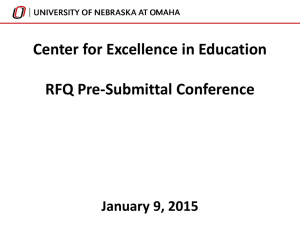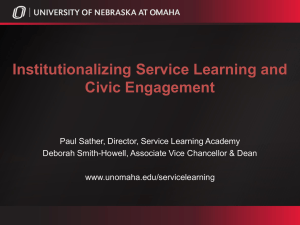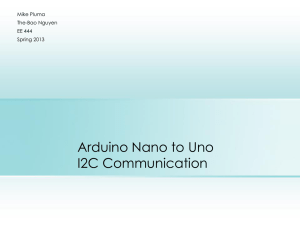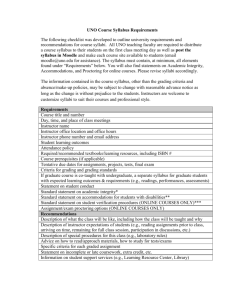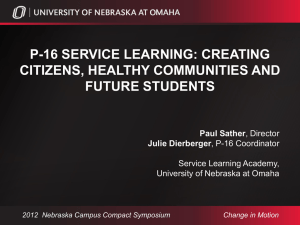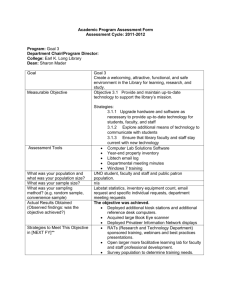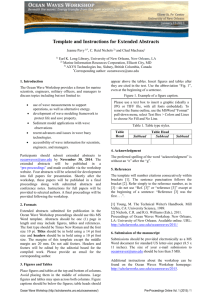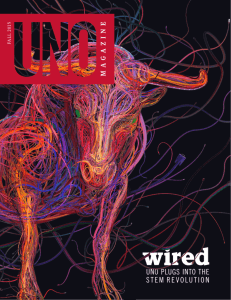Gen Ed Update 10.01.2010 - University of Nebraska Omaha
advertisement
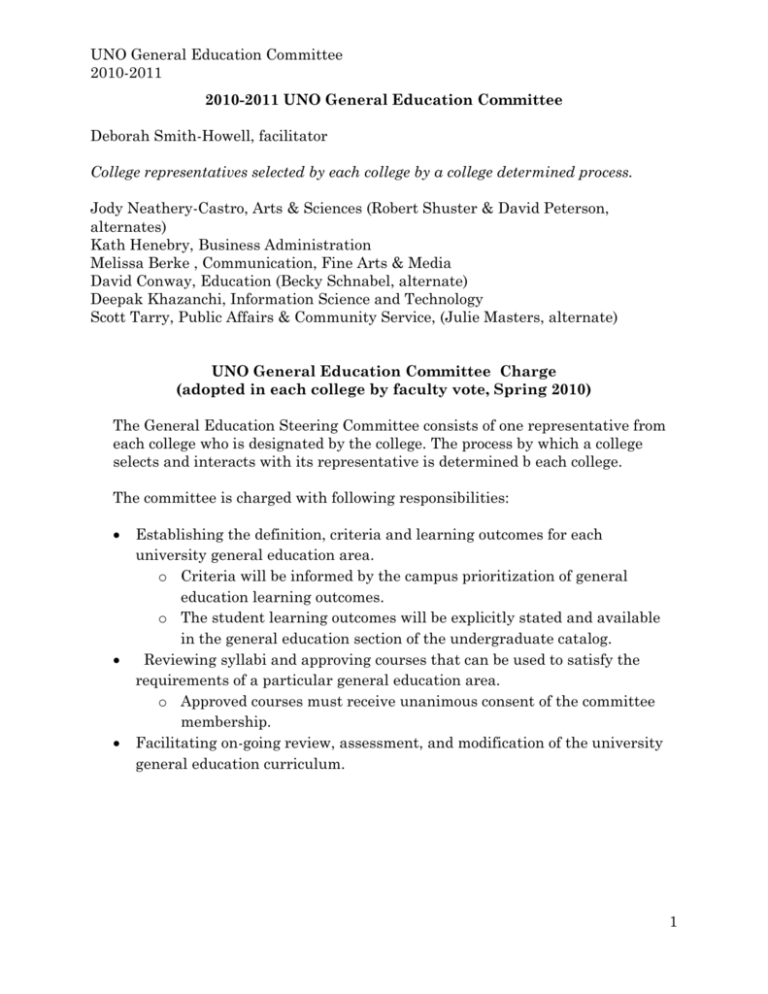
UNO General Education Committee 2010-2011 2010-2011 UNO General Education Committee Deborah Smith-Howell, facilitator College representatives selected by each college by a college determined process. Jody Neathery-Castro, Arts & Sciences (Robert Shuster & David Peterson, alternates) Kath Henebry, Business Administration Melissa Berke , Communication, Fine Arts & Media David Conway, Education (Becky Schnabel, alternate) Deepak Khazanchi, Information Science and Technology Scott Tarry, Public Affairs & Community Service, (Julie Masters, alternate) UNO General Education Committee Charge (adopted in each college by faculty vote, Spring 2010) The General Education Steering Committee consists of one representative from each college who is designated by the college. The process by which a college selects and interacts with its representative is determined b each college. The committee is charged with following responsibilities: Establishing the definition, criteria and learning outcomes for each university general education area. o Criteria will be informed by the campus prioritization of general education learning outcomes. o The student learning outcomes will be explicitly stated and available in the general education section of the undergraduate catalog. Reviewing syllabi and approving courses that can be used to satisfy the requirements of a particular general education area. o Approved courses must receive unanimous consent of the committee membership. Facilitating on-going review, assessment, and modification of the university general education curriculum. 1 UNO General Education Committee 2010-2011 Background 2009-2010 UNO’s strategic plan envisions a student centered institution of academic excellence. In support of this goal, a campus wide discussion about general education learning outcomes was begun in 2007. In Spring 2009, general education was selected as one of three new action projects identified as part of our continuous quality improvement initiative As UNO is an AQIP institution, action projects are key components of UNO’s institutional accreditation. Deborah Smith-Howell, Associate Vice Chancellor for Academic Affairs and Dean for Graduate Studies facilitated the 2009-2010 General Education AQIP Steering Committee. The members of the committee were: David Boocker, Dean, College of Arts and Sciences Dana Richter-Egger, Director, Math and Science Learning Center Joseph Brown, Psychology Shelton Hendricks, Psychology/Faculty Senate David Conway, Associate Dean, College of Education Deepak Khazanchi, Associate Dean, College of Information Science and Technology Scott Tarry, Aviation Institute Julie Masters, Gerontology Lisa Sandlin, Writers Workshop Kath Henebry, College of Business Administration Definition: A general education curriculum is a set of designated courses that represent an “important core of learning, shared by all students no matter their areas of concentration” (Leakes & Miller, General Education: A Self-Study Guide for Review & Assessment, AAC &U, 2005, p. 2) designed to meet specific goals of an institution. Note: While colleges and majors may have specific requirements for students outside the specific major, such requirements are NOT necessarily university general education requirements. Background: UNO’s current “general education” or “core curriculum” (2009-2010, Undergraduate Catalog, p. 69) was developed in 1988 and fully implemented in 1990. However, no mechanism was established for the on-going review, coordination, or assessment of the curriculum, nor were specific learning objectives developed at that time. 2 UNO General Education Committee 2010-2011 Goals for UNO General Education: UNO’s general education curriculum should “ensure that each graduate of UNO possesses certain academic skills, experiences the breadth of a liberal education and develops an appreciation for the cultural diversity that exists in the nation and the world” (2009-2010, Undergraduate Catalog, p. 69). UNO’s general education program curriculum should be student-centered: o There should be clear articulation of the curriculum and options for students. o Students, faculty, and advisors should know how students can meet the university general education requirements. UNO’s general education program should be aligned with the student learning outcomes desired of all UNO graduates as developed by the faculty. There should be identified methods for assessing the effectiveness of the general education curriculum in meeting the goals articulated by the faculty. Need for change: The current general education curriculum is incoherent to internal audiences—students, faculty, and staff—as well as to external audiences, such as accreditation agencies. Students are often confused by and dissatisfied with the current general education curriculum. o Students’ dissatisfaction with academic advising is in part linked to the inconsistency across colleges with what is called “general education”. In the 2007-2008 Baccalaureate Outcomes survey, 24.2% were neutral regarding the “advising I received in my first two years at UNO” and 25.9% were dissatisfied or very dissatisfied. o Significant differences on “general education requirements” across colleges and even across departments/majors within a college can 3 UNO General Education Committee 2010-2011 create confusion for students and advisors (both faculty and professional staff). As the 2009 Academic Advising Task Force discovered, while there are university-wide general education requirements, how students in each major are required to meet the distribution requirements in the social sciences, fine arts & humanities, and natural sciences varies tremendously. o For example, history courses fulfill humanities requirements for the Colleges of Arts & Sciences, Business Administration, and Information Science & Technology and the School of Communication. Those same courses count as social science requirements for the Colleges of Education, and Public Affairs and Community Service and the Departments of Music, Theatre, Art & Art History, and Writers Workshop. A recent development in the College of Communication, Fine Arts and Media will allow for history courses to count as either humanities or social science. o As students change majors many face additional coursework identified as “general education.” o Students may have already met the so-called “general education” requirements of their previous major. o Changing majors is the “norm” rather than the exception at UNO. o Over 50% of graduates who entered UNO as incoming first year students moved to a major in a different college at least once. o Over 40% of graduates who came as transfer students moved to a major in a different college at least once. o These percentages do not include change of majors within colleges, which in some instances actually change the so-called “general education” requirements. Lack of coherence and consistency in general education negatively affects academic advising: o There is a lack of understanding and knowledge of the myriad requirements and variations by colleges and departments. 4 UNO General Education Committee 2010-2011 o Students often perceive that advisors are either incompetent or not student-friendly; that students are given the “run-around.” o Without articulated goals and a known curriculum, advisors cannot help students understand WHY they are taking specific coursework. Without learning objectives or a known curriculum, the university cannot articulate or assess its general education curriculum o Students do not understand why or for what purpose they are taking “general education” courses other than “they say so.” o There is an expectation from the North Central Association /Higher Learning Commission that general education will be explicit and assessable. 5 UNO General Education Committee 2010-2011 UNO’s six academic colleges adopted the following in May 2010: 1. University General Education Requirements a. Definition of University General Education – i. University general education is applicable to all colleges. ii. Individual colleges, schools, departments or units may have additional specific requirements for students. However, these requirements will not be considered as university general education requirements. iii. The courses in university general education distribution requirements will not have any prerequisites beyond the fundamental academic skills requirements ( e.g. English 1150 or Algebra 1310) b. The university general education requirements structure will remain the same as laid out in the current catalog (p. 69). The total credit hours required for university general education will be reduced from the current range of 45-51 to 41-47. This reduction is due to a clarification relating to the inconsistent interpretation of the total distribution requirements (see below) and to be accurate and consistent with what students must do to meet the requirements. The proposed requirements include: 15 credit hours of Fundamental Academic Skills (unchanged) 26 credit hours of Distribution Requirements in the following areas. (Note: Previously the individual minimum for each area added up to a total of 24 credit hours. However, total stated distribution requirements in the catalog were 30 credit hours. This reduction is an attempt to clarify any inconsistent interpretation). Natural & Physical Sciences (8 hours from at least two different disciplines with at least one laboratory course); Humanities & Fine Arts ( 9 hours from at least two different disciplines); and Social & Behavioral Sciences (9 hours from at least two different disciplines). 6 credit hours of Cultural Diversity (may be taken in the distribution requirements). (unchanged) 6 UNO General Education Committee 2010-2011 NOTE: Students may “test out” of the English and Algebra requirements. (unchanged) 2. General Education Steering Committee The General Education Steering Committee consists of one representative from each college who is designated by the college. The process by which a college selects and interacts with its representative is left to each college. The committee is charged with following responsibilities: Establishing the definition, criteria and learning outcomes for each university general education area. o Criteria will be informed by the campus prioritization of general education learning outcomes. o The student learning outcomes will be explicitly stated and available in the general education section of the undergraduate catalog. Reviewing syllabi and approving courses that can be used to satisfy the requirements of a particular general education area. o Approved courses must receive unanimous consent of the committee membership. Facilitating on-going review, assessment, and modification of the university general education curriculum. 7
